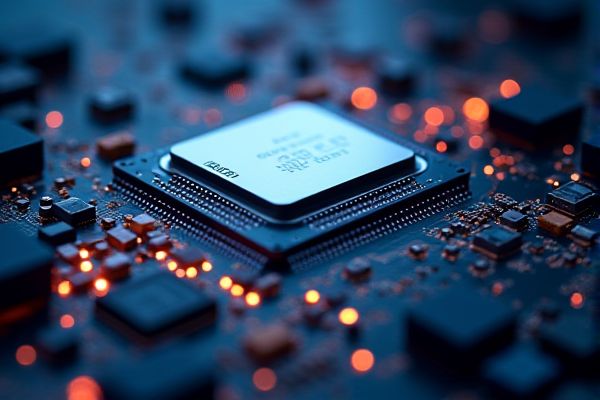
In India, Intel and AMD are the two dominant CPU brands. Intel processors, such as the Core i7 and i5 series, are widely used in laptops and desktops. AMD offers the Ryzen series, which has gained popularity for its performance in gaming and multitasking. Your choice between these brands can impact your computer's performance and compatibility with various applications.
Brands to consider
Intel
Intel is a leading CPU brand in India, renowned for its high-performance processors that power a wide range of devices, from personal computers to servers. Its Core series, including i3, i5, i7, and i9, provides options catering to various computing needs, whether for casual users or gamers. Intel's commitment to innovation is evident in its latest architectures, such as Alder Lake and Raptor Lake, which improve efficiency and processing power. Users benefit from reliable performance, extensive compatibility with software, and advanced features like Intel Turbo Boost and integrated graphics.
AMD
AMD offers a range of CPUs, including the Ryzen series, known for their impressive multi-threading capabilities, making them ideal for gaming and content creation. The brand's innovative architecture, such as Zen 3, delivers a balance of performance and energy efficiency, appealing to cost-conscious consumers in India. AMD's competitive pricing often provides better value compared to Intel, especially in the mid-range segment. With growing support for technologies like PCIe 4.0 and faster memory, AMD is increasingly positioned as a strong choice for both casual users and professionals.
Qualcomm
Qualcomm is a leading CPU brand in India, known for its Snapdragon processors that power a wide range of smartphones and devices. With advanced features like 5G connectivity, AI enhancements, and energy efficiency, Qualcomm's products are integral to modern technology. The company's commitment to innovation and collaboration with major smartphone manufacturers ensures that users experience premium performance and cutting-edge capabilities. Choosing Qualcomm can enhance your device's functionality, enabling smoother multitasking and superior graphics for gaming and applications.
MediaTek
MediaTek is recognized as a leading CPU brand in India, offering a diverse range of processors suitable for smartphones, tablets, and IoT devices. Known for its cost-effective solutions, MediaTek's chips, such as the Dimensity series, provide advanced features like 5G connectivity and AI capabilities, making them attractive for manufacturers aiming to deliver high-performance devices. The brand collaborates with various OEMs, including Xiaomi and Oppo, enhancing its presence in the Indian market. With efficient power consumption and robust performance metrics, MediaTek processors cater to the needs of both developers and consumers in a rapidly evolving tech landscape.
Samsung
Samsung offers a diverse range of CPUs known for their advanced technology and reliability, making them a competitive choice in India. Their Exynos processors provide efficient performance for smartphones and tablets, catering to various user needs. Samsung's commitment to innovation ensures that their CPUs often incorporate the latest features, such as energy efficiency and enhanced graphics capabilities. Furthermore, the brand's strong presence in the Indian market and robust customer support enhance the overall experience for users selecting their products.
Market Share
In India, the CPU market share is dominated by brands like Intel and AMD, with Intel commanding a significant portion due to its long-standing presence. AMD has gained traction with its Ryzen series, appealing to gamers and content creators. According to recent market analysis, Intel holds approximately 60% of the market share, while AMD follows with around 30%. The remaining share is occupied by other smaller brands, reflecting a diverse landscape in the Indian CPU market. Your choice of CPU can impact performance and compatibility with various applications and hardware configurations.
Performance
The performance of CPU brands in India varies significantly, with Intel and AMD being the leading contenders. Intel's Core i5 and i7 series are popular among gamers and professionals for their speed and efficiency, while AMD's Ryzen 5 and Ryzen 7 offer excellent multi-threaded performance at competitive prices. Benchmark results often show AMD gaining traction in both gaming and productivity applications due to its favorable price-to-performance ratio. Enthusiasts and budget-conscious consumers are increasingly considering these factors while making purchasing decisions.
Pricing
CPU pricing in India varies significantly based on brand and specifications. Intel and AMD are among the leading brands, with Intel's Core i9 processors priced higher due to their advanced features. AMD's Ryzen series offers competitive pricing, often appealing to gamers and content creators. You can find processors ranging from Rs7,000 for entry-level options to over Rs70,000 for high-end models. Availability and regional demand can influence these prices across various online and offline retailers.
Compatibility
In India, compatibility for CPU brands such as Intel and AMD is an important factor for building or upgrading a computer. Users must consider motherboard compatibility, as not all motherboards support both Intel and AMD processors. For instance, an Intel Core CPU will require a compatible Intel chipset motherboard, while an AMD Ryzen series processor needs an appropriate AMD motherboard. Your choice of RAM type and speed also impacts performance, as different generations of CPUs may have specific requirements for memory compatibility.
Innovations
In India, the CPU brand Intel has introduced various innovations to cater to the growing gaming and enterprise markets. Their latest processors, such as the Intel Core i9 series, offer advanced multitasking capabilities and improved power efficiency for a wide range of applications. AMD is also making strides with its Ryzen series, focusing on high-performance computing. Embracing AI technologies, companies are enhancing CPU architectures to support more efficient data processing and machine learning applications.
 indiabrand.org
indiabrand.org